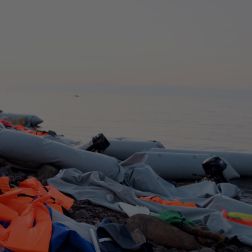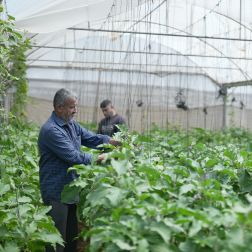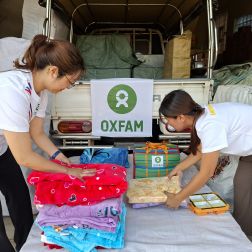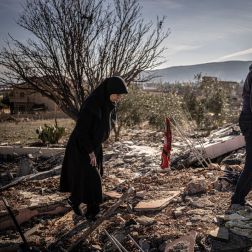- 4 mins read time
- Published: 22nd March 2018
Hungry, thirsty and needing care
To mark World Water Day, we present the first of a three part blog by Ibrahim Alwazir, Oxfam’s Social Media Officer in Yemen.
Part 1: Hungry, thirsty and needing care

Left: Residents waiting since early morning for a water truck. Photo: Ameen Al-Ghaberi/Gabreez Right: Dispute over the water project in Al-Shanitifah village in Amran governorate. Photo: Oxfam Yemen/Hassan Shuaifi
I was recently on my way to Al-Shanitifah village, in Habor Zulaimat district in Amran governorate, to interview some of the people Oxfam is helping. The road was long and rough, and based on what I’d heard, I was expecting the place to be isolated and abandoned, except for the unfortunate residents who had no choice but to live there.
On an unpaved road, a donkey was travelling with jerry cans on its back, dirty and empty ones, led by an unfortunate lady carrying sorrow over her shoulders.
In many villages in Yemen, for so long it has been the women's job to fetch water, so much so that I have started to believe their genes have evolved to enable them to do that job better than any athlete or professional climber.
In an isolated place, where dust covers human skin as it covers roofs, wandered a boy with a stick in his hand playing around some sheep that he met by chance. Both the boy and the sheep had something in common – they both were hungry, thirsty and needed care.
To my surprise, after 10 kilometres of that bumpy road, we suddenly arrive at this heavenly place: I first saw the stream, which I didn’t expect, but I know that water brings life wherever it flows and so it did in that rough place. Trees were growing over both sides of the water stream, camels were passionately drinking water, quenching their thirst after a long journey, birds were flying above, while flamingos proudly stood on one leg. A cool breeze of fresh air carried an aroma of what I like to call Earth, straight into my lungs. I took a deep breath and allowed myself to enjoy the beauty of nature one can hardly resist.
We finally reached our destination and what felt like a beautiful dream was interrupted by the unpleasant reality of sounds of angry men and faces of scared women sneaking behind opened doors and semi-closed windows.
Oxfam had dug a well and built water distribution points in Al-Shanitifah village, which was the best location considering it was serving the most populated area, while still close to other nearby villages. However, residents of one of them disagreed with that decision and had promised to destroy the water project during a quick fight, a few minutes before we arrived. Despite being 300 metres away from their small village, they thought they should have a well too, as it would be unfair otherwise. Before the water project was built, it took the nearest villagers two kilometres to reach the nearest water source, which is the stream we had seen on the way. But now the villagers only travel less than 500 metres, for those furthest away, to reach Oxfam’s water project.
The fight ended quickly as the water authority and the village leaders intervened and promised to solve the issue. They explained to the villagers the reasons for choosing that location for the water project to be built. After everyone calmed down, I smiled and greeted one of the villagers whose eyes explained how sorry he was that I had to witness that. I said hi and asked him to join me so we could have a chat in a nearby place away from the crowd.
One of the world's gravest humanitarian crises.
More than 14,600 civilians have been killed or injured during three years of devastating conflict in Yemen and over 2,200 others have died of cholera, mostly children and the elderly. Over three million people have been forced to flee their homes due to the bombing and fighting. The country is on the brink of famine and is also now suffering the largest ever outbreak of cholera since records began, as nearly 1 million cases have been reported. 22 million people in Yemen are in dire need of immediate humanitarian assistance, the greatest number in any country in the world.

Left and Right: Women from Al-Dhafer village in Amran governate carrying water. They walk for two hours back and forth. Photo: Ameen Al-Ghaberi/Gabreez
Oxfam is there
Since July 2015, Oxfam has reached more than 2.8 million people with humanitarian assistance, with the help of our local partners in Yemen. Help includes water and sanitation services, cash assistance and food vouchers.
We are delivering emergency aid but we urgently need your help to do more.
Make a donation to support our work




